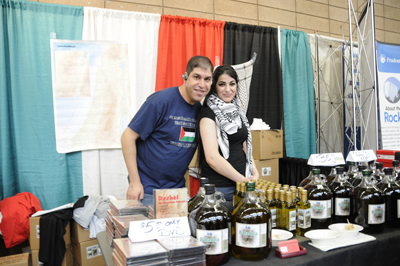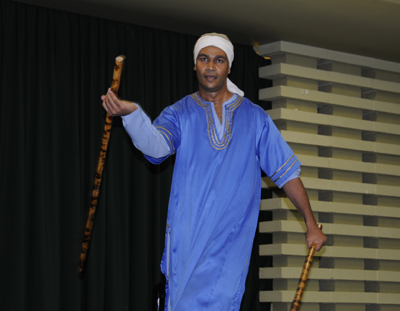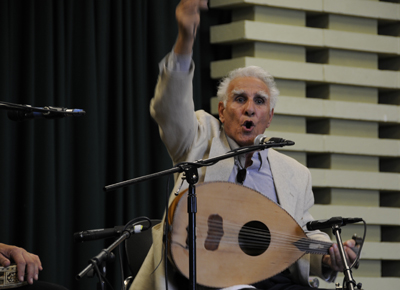 What are the connecting threads of a cultural celebration that includes among its constituents people from twenty-two countries, each with their own linguistic, artistic and political history? And what about the region’s religious plurality? With this snapshot of complexity in mind, one connecting thread seems to be the celebration and affirmation of cultural arts. These activities were in abundance at the 14th annual Arab Cultural Festival aptly themed, Ya Hala, the Arabic word for welcome.
What are the connecting threads of a cultural celebration that includes among its constituents people from twenty-two countries, each with their own linguistic, artistic and political history? And what about the region’s religious plurality? With this snapshot of complexity in mind, one connecting thread seems to be the celebration and affirmation of cultural arts. These activities were in abundance at the 14th annual Arab Cultural Festival aptly themed, Ya Hala, the Arabic word for welcome.
The one-day event featuring traditional foods, service provider booths, merchandise to buy like Moroccan jewelry or Lebanese olive oil, and ongoing entertainment has become a focal point where the diverse Bay Area population can come together. The event was well attended by an estimated 3,500 people, primarily from the Arab community.
A quick glance around the site was indicative of the community: intergenerational family groups, young people in T-shirts proclaiming sentiments of Arab pride, some women wearing discreet head scarves signifying their Muslim practice, others in embroidered Palestinian traditional dress, yet the majority of women dressed as any other American woman might dress for a light summer day. Kafiyahs, the traditional head scarves associated with the Middle East were worn in abundance, as symbols of cultural pride by many of the attendees.

Organized by the Arab Cultural & Community Center and supported in part by a grant from ACTA’s Living Cultures Grants Program, the Arab Cultural Festival included more traditional and folk artists this year in their broad offerings of entertainment. Included in the afternoon roster were poetry readings; rai music of North Africa; Palestinian debkeh dance by the much cheered and encouraged community-based group, Al-Juzoor; Yassir Darwish performing the stick or tahib dance of Upper Egypt; Tunisian hip-hop artist, Triki; as well as the George Lammam Ensemble, one of the only all-acoustic ensembles in the U. S. with an extensive repertory of Levantine, Iraqi and Egyptian classical and popular standards.
Of particular note was the appearance of Mr. Saadoun Al-Barati, singer, oudist, and percussionist from Baghdad. His early training in Quranic recitation prepared his voice to achieve gradations of tone, which are evident in the largely secular program he shared with festival attendees. There were a number of Iraqis in the crowd who responded with recognition and sang along with his songs from regions like Basra. He performed with his daughter, Samar Al-Barati, on percussing. They currently live and teach in the Los Angeles area.
 The Festival is a program of the Arab Cultural & Community Center, which is located in San Francisco. The nonprofit provides social services and referrals for adults and children, with a primary focus on women. Providing a full roster of Arab language classes and cultural programs and events throughout the year, the demands on the small organization are many. The development of cultural offerings in particular is seen as an important organizing tool that can bring the diverse population together in effective ways. The cultural arts are important ways in which to instill pride and help to counter negative stereotypes that are current in our present political climate.
The Festival is a program of the Arab Cultural & Community Center, which is located in San Francisco. The nonprofit provides social services and referrals for adults and children, with a primary focus on women. Providing a full roster of Arab language classes and cultural programs and events throughout the year, the demands on the small organization are many. The development of cultural offerings in particular is seen as an important organizing tool that can bring the diverse population together in effective ways. The cultural arts are important ways in which to instill pride and help to counter negative stereotypes that are current in our present political climate.
